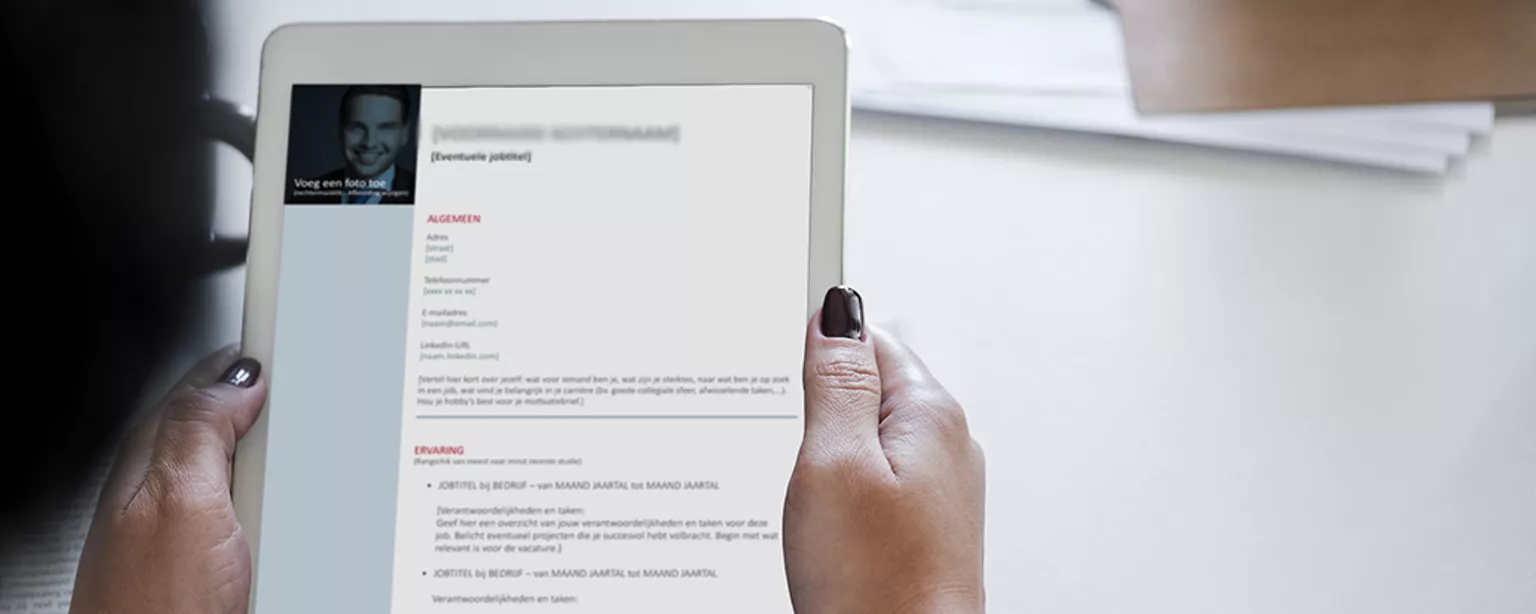Dos cervezas por favor. If that’s the extent of your ‘basic knowledge’, don’t claim to speak Spanish. It’s one of the 10 things recruiters absolutely don’t want to see in a CV.
About to apply for a job? Read the following list to avoid making mistakes these mistakes.
Sloppy layout
Sending your CV as a Word file, using different fonts or font sizes, opting for a creative design for a vacancy that has nothing to do with design, using an e-mail handle like ‘$kAter2002@’, ... These are all things that make your CV look sloppy. Your potential boss won’t be impressed. And that isn’t going to help your chances of getting an interview.
Only mentioning the job content of your present and former jobs, without any achievements
Just mentioning what you were getting paid to do won’t earn you any bonus points. Employers expect and demand performance from you. The same goes for your future boss.
So if you’re applying for a job as a credit controller, don’t just mention that you perform payments checks in your current job. Instead, describe the improvements you made that led to a 50% reduction in late payments.
Obsolete or irrelevant experience
There is no need to include everything you’ve ever done in your CV. Your potential boss doesn’t want to play ‘Where’s Wally’ with your shopping list of jobs. Help them by only listing the full-time, part-time or even student jobs that are relevant to the job you’re applying for. This will only improve your chances.
Of course, it’s a different story if you’re a recent graduate with limited experience. In that case, mention what might be relevant and, in particular, what you learned from it. If you were a youth camp leader, for example, you probably learned about leadership, but also about working in a team and being creative (e.g., by thinking up games).
Unexplained gaps in your timeline
Although there’s nothing wrong with exiting the job market for six months or more, you’ll have to properly explain this gap. Perhaps you were travelling the world or helping a family member through a difficult time? If you’re honest, you’ll make a trustworthy impression. Mention in your covering e-mail that you are happy to explain why you took a sabbatical.
A covering e-mail that reads like a novel
Keep your covering e-mail short and to the point. Be professional and explain briefly and clearly which job you are applying for. Only mention your strongest and most relevant selling points, only provide essential information. Your CV should contain all other relevant information.
A long list of software you don’t actually know that well
‘Excellent knowledge of Word, Excel and PowerPoint’. Hopefully, you can do more than just type in Word, make a quick calculation in Excel or duplicate a slide in PowerPoint. If not, just say ‘basic knowledge’.
Call yourself an Excel expert if you can create pivot tables, build data models and work with VLOOKUPs. Provided you know enough to hold your own in a job interview, you will be fine.
Feel confident about adding something to your CV, but be careful not to promise anything you can’t deliver on. If you’re found out, the recruiter will undoubtedly wonder which other skills you laid on too thick. And that’s not a great way to apply for a job.
Inconsistency with your LinkedIn profile
It was easier in the old days when you just needed to update your CV to make a good impression on a potential employer. Nowadays, your LinkedIn profile is another essential source of information. So make sure the two don’t contradict each other. Although you don’t have to copy everything word for word, you should pay attention to the consistency of dates and skills.
Spelling errors and long sentences (use bullet points)
Sure, the main goal is getting your message across. But don’t underestimate the effect of language errors in your CV. Spelling or grammatical errors in your CV reveal that you’re careless in your work. Obviously not a good advertisement.
Also avoid excessively long sentences and large blocks of text. Write briefly, in the active voice, using only essential words. Where possible, use bullet points. That way, the recruiter can quickly spot the most relevant information. They look at dozens of CVs every day, so make it as easy as possible for them.
Meaningless buzzwords and clichés
Labelling yourself a ‘team player’ and ‘creative’ will not make much of an impression. These terms are often overused (and abused) and say nothing at all about who you are. Don’t say ‘I have a ready pen’ but ‘I was writing two articles a week that were each read a thousand times on average’. A more specific profile makes a better impression.
Incorrect contact information
‘Believe it or not, but there are actually people who write the wrong telephone number or link old LinkedIn profiles! It takes less than a minute to check whether the information you provide is correct. So make an effort and avoid ruining your chances of getting a job interview.
Download our cv template for free and increase your chances of a job interview.
The curriculum vitae or cv determines the first impression a potential employer has of you. Be sure to pay enough attention to the content and the format of it.
Download our cv template for free and increase your chances of a job interview.
- Download the example as a Word file
- Enter your details
- Export as a PDF
- Mail your brand new resume along with your motivation letter to companies
- Don't hesitate to send in your resume to Robert Half, we are happy to help you with your job search
- Print it and take it with you to your first interview







